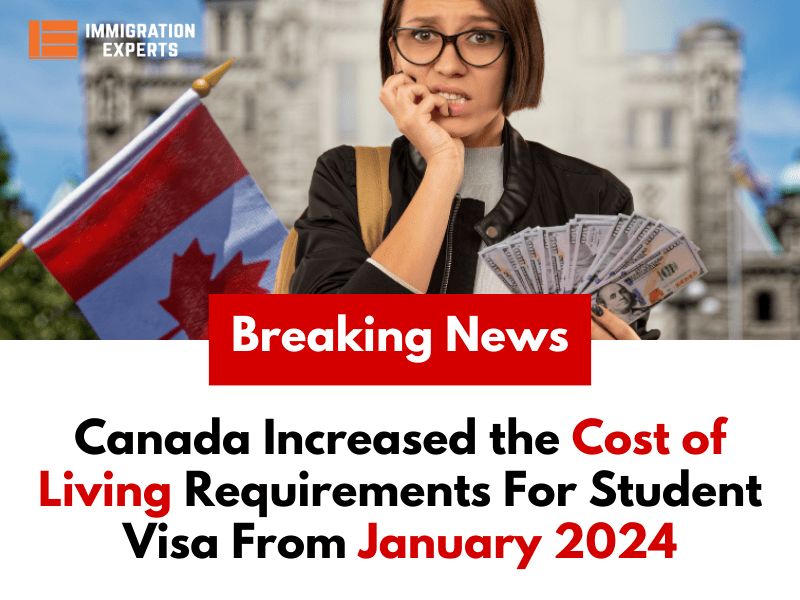051 8439995, 042 35911332

Canada is a preferred destination for global students. This is because of its good-quality schools and a welcoming, diverse society. After finishing their studies, some students get opportunities to work or immigrate permanently.
International students enrich campus life and contribute to innovation across Canada. However, they encounter challenges, such as finding suitable housing during their studies in the country.
The Honourable Marc Miller, Minister of Immigration, Refugees and Citizenship, shared that beginning January 1, 2024, the financial requirement for study permit applicants will increase. This change aims to ensure that international students are financially ready for their life in Canada.
Moving ahead, this financial threshold will be modified annually to align with updates from Statistics Canada regarding the low-income cut-off (LICO). The LICO reflects the minimum income needed to ensure individuals don’t have to spend more than the average portion of their income on necessities.
Things You Will Find In This Page
Canada Increased the Amount of Cost-of-Living Requirements
The cost-of-living requirement for study permit applicants has remained unchanged since the early 2000s, at $10,000 for a single applicant. However, this static figure has not kept pace with the increasing cost of living over the years. Consequently, students arriving in Canada have found that their funds fall short.

Starting in 2024, a single applicant must demonstrate financial readiness by having $20,635, representing 75% of the Low-Income Cut-Off (LICO). This amount is in addition to covering their first-year tuition and travel expenses. It’s important to note that this adjustment applies to new study permit applications received on or after January 1, 2024.
This Change Ensures Support for International Students
The upcoming change in financial requirements aims to safeguard students from vulnerability and exploitation. However, we acknowledge that the effects of this change may differ for each applicant. In the coming year, we plan to work closely with partners to initiate targeted pilot programs. These programs will test innovative ideas designed to support underrepresented groups of international students in pursuing their studies in Canada.
This announcement comes after significant changes to the International Student Program were revealed on October 27, 2023. These reforms involve establishing a fresh framework to acknowledge educational institutions that offer high-quality services and assistance, including suitable housing, to international students. It is anticipated that learning institutions will only admit some students for whom they can provide ample support, including appropriate housing options.
When welcoming international students, we bear the responsibility of ensuring their support in our country. In preparation for the September 2024 semester, we are ready to implement essential actions, including potential visa limitations. This is to guarantee that designated learning institutions offer appropriate and ample support to students as an integral part of their academic journey.
Achieving this goal requires collaborative efforts with provincial and territorial governments, learning institutions, and other education stakeholders. By working together, we aim to ensure that international students have the necessary foundations for success in Canada.
Temporary Policies Affecting International Students
Minister Miller shared updates on three temporary policies affecting international students, originally set to expire by the end of 2023. Here are the details:
- Extension of Off-Campus Work Hours: The waiver allowing international students to work more than the 20-hour-per-week limit off campus during class sessions will be extended until April 30, 2024. This applies to students already in Canada and those who submitted a study permit application by December 7, 2023. Future considerations include exploring the possibility of allowing up to 30 hours per week for off-campus work.
- Credit for Online Study Towards Post-Graduation Work Permit: The measure permitting international students to count online study time (up to 50% of the program) toward a post-graduation work permit will continue for those starting a program before September 1, 2024. However, it won’t apply to students commencing studies on or after that date. This measure, introduced in 2020 during the pandemic, acknowledges the changing landscape of international education.
- Temporary Policy for Post-Graduation Work Permit Holders: There is a temporary policy in place that provides an additional 18-month work permit to post-graduation work permit holders. This policy is specifically for individuals whose permits are expiring due to disruptions in the labor market caused by the pandemic. The extension applies to those whose permits are set to expire up until December 31, 2023. This measure aims to offer support to individuals facing challenges in the job market due to the ongoing impact of the pandemic. Note: this policy won’t be extended beyond this date.

Acknowledging the valuable contributions of international students to Canada socially, culturally, and economically, these measures aim to address challenges faced by students, ensuring a more robust and supportive International Student Program. The recent increase in the cost-of-living threshold further strengthens the financial foundation for students arriving in Canada.
IRCC Minster’s Thoughts about Changes in Cost of Living Requirements
International students contribute immensely to their communities’ cultural, social, and economic fabric. However, they encounter challenges in adapting to life in Canada. To address this, we are updating the cost-of-living requirements, ensuring international students have a clear understanding of the actual living expenses. This step is crucial for their success in Canada. Additionally, we are actively exploring solutions to secure suitable housing for students. These overdue adjustments aim to shield international students from financial vulnerability and exploitation.
Role of International Students in Canada’s Economy
The Canadian economy benefits from international education approximately $22 billion annually. This surpasses the economic impact of Canadian exports in auto parts, lumber, or aircraft and sustains over 200,000 jobs in the country. Quebec independently sets its cost-of-living threshold for international students attending its learning institutions, periodically adjusting it. These updated financial guidelines extend to the Student Direct Stream, a unique study permit application process for residents of 14 countries. This stream demands extra upfront information from applicants and offers priority processing.
